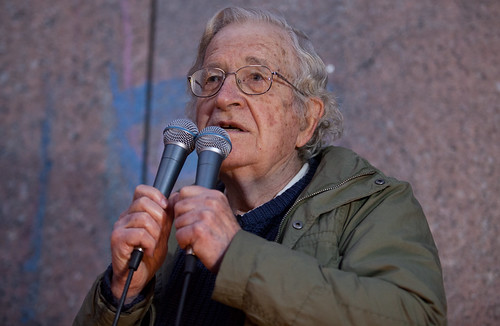Occupy
By Noam Chomsky
$9.95, Penguin
Occupy by Noam Chomsky is the first of the Zuccotti Park Press/Occupied Media Pamphlet Series produced by the US Occupy movement. The short book is a collection of Chomsky’s speeches made at various Occupy events and pays homage to the political significance of the movement.
The notion of the 99 per cent challenging the wealth and power of the 1 per cent resonated around the world. The radicalism displayed in the movement’s many inspiring demonstrations, strikes and occupations has re-established the idea that mass collective action does have the power to challenge the status quo.
Chomsky accurately situates the Occupy movement as a response to three decades of rampant neo-liberalism. He rails against the brutality and injustice of the era that has dramatically increased inequality in the US (and elsewhere).
Strategy
In the book’s transcripts of Chomky’s speaking events at Occupy, he constantly faces questions at his meetings about what is the best strategy to change the world. On this point Chomsky is disappointing. He makes vague comments about building “public support” and “going out and joining them” (the public), without specifying any clear, practical method. Chomsky warns: “you don’t win victories tomorrow. You…have to form structures that will be sustained, that will go on through hard times and can win major victories”. But what these structures are remains undefined.

He argues that one of the key successes of Occupy has been “creating communities”, through the assemblies and popular democracy, but doesn’t explain how such communities can be sustained or generalised to run society as a whole.
When asked whether the movement should cohere around some key demands, Chomsky’s anarchist principles make him equally vague, saying that a multiplicity of demands is natural and right. But this approach leads to a strategy in which very different actions are equally prioritised. Holding an assembly or a workshop is regarded as equally valuable as a demonstration, or a strike of tens of thousands.
Chomsky’s confusion about how to fight is coupled with confusion about what kind of a society the movement could fight for. He strangely glorifies the post World War II “golden age” of capitalism as “egalitarian”. He says that there was steady growth during that period and few crises because “banks were regulated”. But re-regulation of capitalism wouldn’t make capitalism any more just. Financialisation, unemployment, and immense concentration of wealth are the inevitable outcomes of a system that prioritises profits over people.
Chomsky repeatedly points to “worker takeovers” of factories and enterprises as the foundation of an alternate system to capitalism; “the basis for a real revolution”. But such takeovers are framed in limited terms of workers “buying” businesses and running them in a market system. Yet it is the very dynamics of the market system that has caused massive crisis and driven people to look for an alternative!
Workers’ control does not come from taking over businesses and trying to run them profitably within the system. It comes from challenging the logic of the system through rebuilding unions and workers’ confidence to fight job cuts and defend conditions.
Chomsky’s confusion about how to struggle for a better world reflects the confusion within the movement itself. The Occupy movement initially galvanised and mobilised widespread discontent at the system’s injustices. It acted as a hub for unions, people being evicted as well as student and anti-racist activists. But the insistence on a decentralised and leaderless movement by dominant sections of Occupy obstructed the development of accountable structures capable of coordinating mass actions.
Occupy Oakland’s general strike in November last year mobilised tens of thousands of protestors and workers to shut down parts of the city, including the port. It demonstrated the potential to extend the spirit of Occupy from the squares to the workplaces. But without a strategy to build on and generalise these actions, the movement has stagnated and declined.
Instead, the movement has focused on the tactic of occupation and confrontation with the police which have resulted in lengthy legal disputes. For Occupy to move forward, it would have to re-connect with its mass support base and organise grassroots campaigns around the concrete issues urgently affecting ordinary people, like public housing, education, union struggles and police brutality. A strategy that links issues of popular discontent with the power of the organised working class has the potential to bring about real change.
Chomsky’s book is, nevertheless, an interesting read. It provides a thorough account of the backdrop to the explosion of the Occupy movement. The discussion of how we can fight for a different world in the ongoing struggles against austerity and cuts and against the 1 per cent is one that must be continued.
Daisy Farnham





